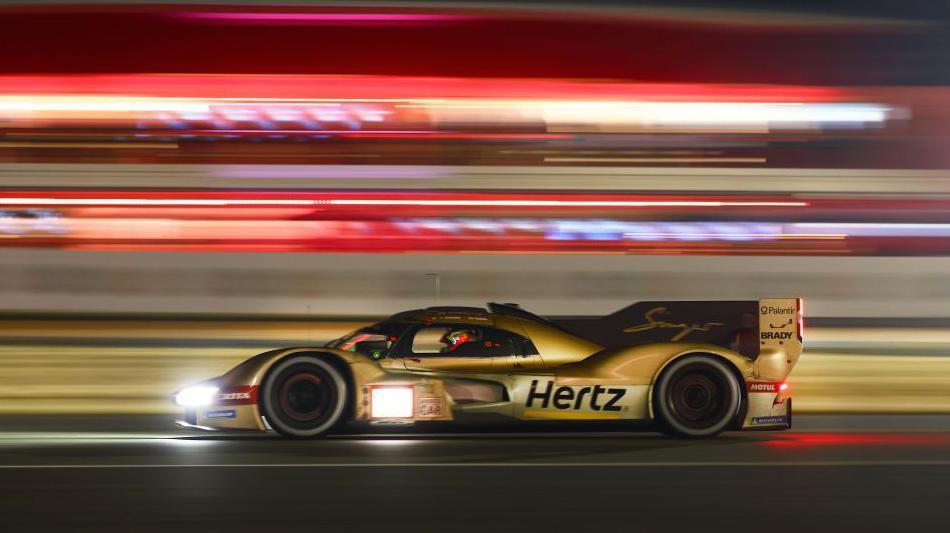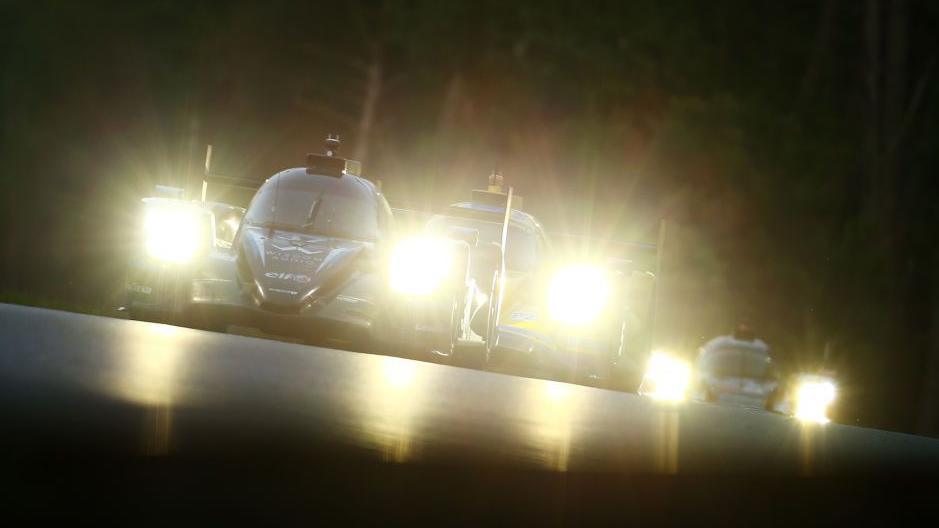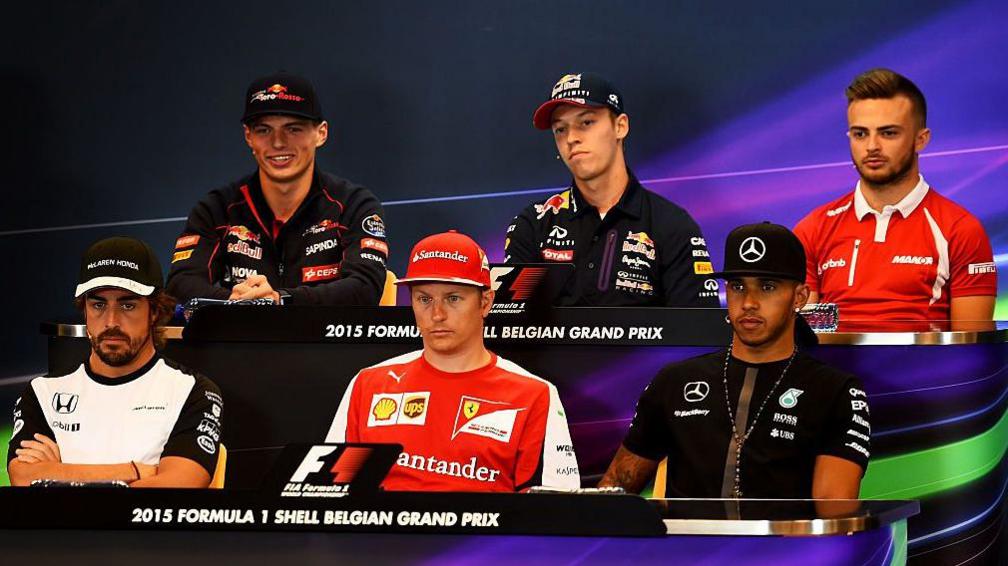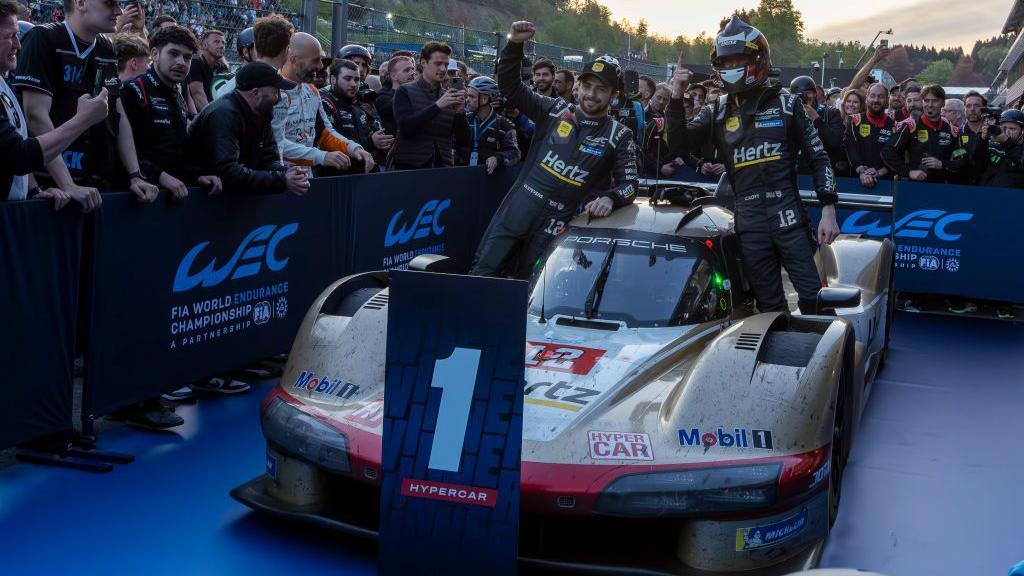'Adrenaline of night racing what makes Le Mans iconic'

Will Stevens is aiming for his third victory at Le Mans when he drives the Jota Porsche 963 in the hypercar category this year
- Published
Three o'clock in the morning. No sleep. Couldn't sleep. Should have slept. But it's too late because it's time to race again. Out into the pitch dark, driving at up to 200mph. You have to adjust immediately.
This is what makes the 24 Hours of Le Mans so special, says two-time winner Will Stevens.
"It's very difficult to adapt to the night-time but once you're in it you feel very much in the zone," he told Game Changers for BBC Local Radio.
"As much as you don't want to drive in the night in these things, it's actually the best part of the race.
"The adrenaline is running and it's hard to switch off when you're out of the car, it's an iconic race because of it."
Ex-Formula 1 driver Stevens, 32, has won Le Mans in two of the main categories and this year he is aiming to add a third title in the fastest and most prestigious, the hypercar.
The Surrey-based driver, who grew up in Essex, won the GTE Am category, an amateur race now known as LMGT3, in 2017, before winning the LMP2 category two years ago.
Last year he moved up to race in the hypercar in the World Endurance Championship with the Hertz Jota team.
He will drive the Jota Porsche 963, along with fellow Brit Callum Ilott and Frenchman Norman Nato, with former Formula 1 world champion Jenson Button in the team's other car.
Stevens goes into this year's race on the back of victory in the 6 Hours of Spa in Belgium last month, as well as a second-placed finish in Qatar in March.
'I have a pass from the wife' - Button back racing
- Published15 December 2023
Hamilton unconvinced by new F1 rules for 2026
- Published6 June 2024
'We didn't sleep at all'

Will Stevens was part of the Hertz Jota team that won the LMP2 race at Le Mans in 2022
"The 24 Hours of Le Mans is one of the biggest races in the world," he said.
"It is the race that everyone wants to win. I’ve been lucky enough to win it twice now. A lot goes on, you can never plan fully for the race because it always throws a lot at you but nowadays the teams are at such a high level.
"The goal is to win. We won Spa so there's no reason why we can't win this one."
When Stevens won in 2022, he raced with Portuguese driver Antonio Felix da Costa and amateur Roberto Gonzalez, of Mexico.
He and Da Costa drove back-to-back overnight from just before 11pm to 5.40am, getting no sleep between them, with Da Costa taking the first and third stints and Stevens slotting in in the middle that night.
"We didn't sleep at all during the evening but those types of strategies are what won us the race because we could build a big gap to the others and then it was easier to manage," he said.
He gives nothing away as to his team's tactics for this weekend.
Finances for young Formula 1 drivers 'misunderstood'

Will Stevens [top right] raced in the 2015 Formula 1 World Championship against drivers including Max Verstappen, Fernando Alonso and Lewis Hamilton
Aside from endurance racing, Stevens is a test and development driver for McLaren.
Now he works mainly in the simulator, which is a far cry from his early Formula 1 days where he raced for Manor Marussia in the 2015 World Championship and once for Caterham in Abu Dhabi the year before.
Like many young drivers, he paid to race - £500,000 to make that debut - and he said the notion of the "pay-driver" in motor racing is misunderstood, particularly around Formula 1.
"What people don't realise outside of motorsport is every single person on the grid has funded themselves up to where they are," he said.
"People at the very top winning races recently, they've had substantial money behind them. And you don’t get anywhere in the sport unless you have that.
"Everyone brings money at the start into Formula 1, unless you're with the Ferrari or Mercedes driver programmes, and even then with young driver programmes now, people are paying to be on them.
"And that's where people don't really understand motorsport, how it actually works. You have to make the transition from bringing money, to racing for free, to being paid to drive."
'You can't win on your own'
Stevens failed to score a point in his 18 Formula 1 races, but has made the transition to build a successful career in endurance racing, with Mick Schumacher, Nyck de Vries and Paul di Resta also racing at Le Mans this weekend.
One of the things he noticed when he moved was how individual the mindset of a Formula 1 driver is, which was something he needed to adjust when he began endurance racing.
"It's making sure your drivers are in the right frame of mind because they're sharing the experience with you. You can't win a race like the 24 hours of Le Mans on your own," he added.
"There are 30-odd pit stops during the race, each driver is in the car for a significant amount of time. So you need to make sure that as much as you're doing your job, everyone else around you is doing their job, too.
"It's different in endurance racing, and I enjoy that part of it. It's much more open to people, it's a happier experience and I think people feel more part of [it] when you go and win a race."
The 24 Hours of Le Mans race begins at 15:00 BST on Saturday.

Hertz Jota are looking to follow their hypercar win at the 6 Hours of Spa in the 24 event at Le Mans